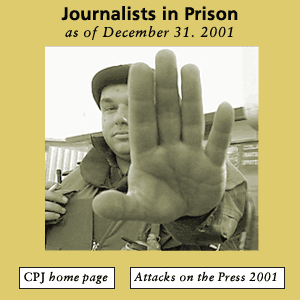Attacks on the Press 2001: Introduction
IN THE WAKE of September 11, 2001, journalists around the world faced a press freedom crisis that was truly global in scope. In the first days and weeks after the terrorist attacks on New York City and Washington, D.C., governments across the globe–in China, Benin, the Palestinian Authority Territories, and the United States–took actions to…
Attacks on the Press 2001: Africa Analysis
Silence reigned supreme in Eritrea, where the entire independent press was under a government ban and 11 journalists languished in jail at year’s end. Clamorous, deadly power struggles raged in Zimbabwe over land and access to information, and in Burundi over ethnicity and control of state resources. South Africa, Senegal, and Benin remained relatively liberal…
Attacks on the Press 2001: Rwanda
President Paul Kagame surprised his own cabinet in December when he refused to sign a contentious media bill that prescribed the death penalty for journalists found guilty of inciting genocide. Lawmakers passed the bill in September, citing the macabre role that certain Rwandan media outlets played in promoting and orchestrating the 1994 massacre of more…

Attacks on the Press 2001: Journalists in Prison
There were 118 journalists in prison around the world at the end of 2001 who were jailed for practicing their profession. The number is up significantly from the previous year, when 81 journalists were in jail, and represents a return to the level of 1998, when 118 were also imprisoned.
Attacks on the Press 2000: Rwanda
WHEN FORMER VICE PRESIDENT PAUL KAGAME WAS ELECTED PRESIDENT in April, he berated local reporters for exaggerating Rwanda’s problems. Nevertheless, there were plenty of genuine problems for the country’s media to report. In neighboring Tanzania, meanwhile, the International Criminal Tribunal for Rwanda (ICTR) was coming to grips with the 1994 slaughter of nearly a million…
Attacks on the Press 1999: Preface
By Philip GourevitchNearly a hundred years ago, in Boston, the Congo Reform Association published a pamphlet by Mark Twain, titled King Leopold’s Soliloquy, A Defense of His Congo Rule (1905). The text is an imagined monologue by the Belgian monarch, delivered as he reads through stacks of literature protesting the systematic murder and mutilation of…
Attacks on the Press 1999: Africa Analysis
By Claudia McElroyAll over Africa, conflict continued to be the single biggest threat to journalists and to press freedom itself. Both civil and cross-border wars were effectively used as an excuse by governments (and rebel forces) to harass, intimidate, and censor the press–often in the name of “national security”–and in some cases to kill journalists…
Attacks on the Press 1999: Rwanda
The prosecution of Rwandan journalists suspected of inciting members of the ethnic Hutu community to massacre ethnic Tutsis in 1994 proceeded in fits and starts over the last three months of the year. Four journalists currently face charges that include incitement to genocide. In June, Belgian-born radio-talk show host Georges Ruggiu admitted his involvement with…
Civility by Decree: Strange bedfellows
The international presence in Kosovo has other important repercussions for local journalism. Many of the best local journalists are taking lucrative jobs as translators and media professionals for the many multilateral and non-governmental organizations that have set up shop in Pristina since the Yugoslav military withdrawal. “I can’t compete with their salaries,” says Margarita Kadriu,…